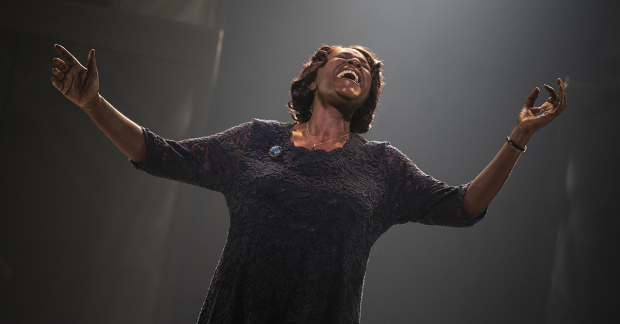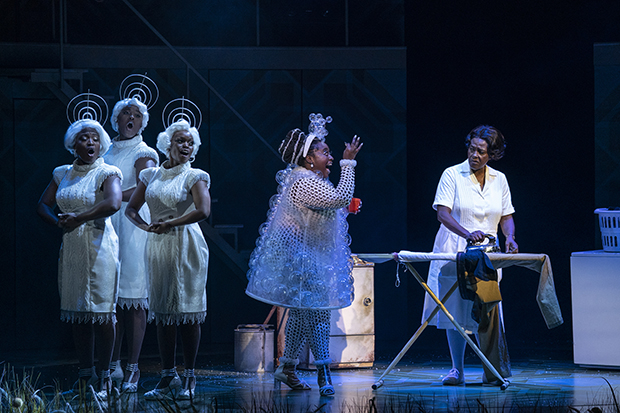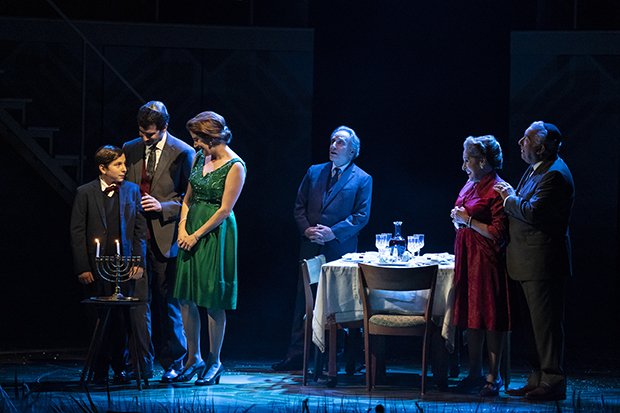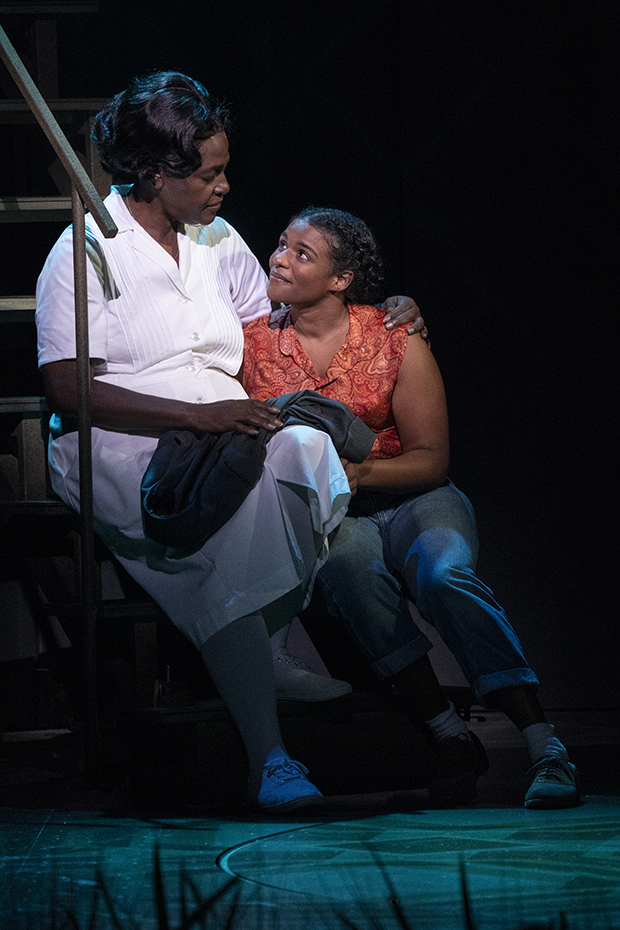Review: Caroline, or Change Comes Into Its Own on Broadway in Magnificent New Revival

(© Joan Marcus)
It was a golden season for musicals. Ragamuffin puppets sang hilarious anthems about internet pornography. The Wicked Witch of the West told her side of the story. Hugh Jackman did the samba in golden leather pants. And a Black housekeeper found herself stuck "sixteen feet below sea level" as societal upheaval swirled around her. Avenue Q ran for more than a decade. Wicked is still going strong. The Boy From Oz showed the world that Wolverine could sing and dance. As for Caroline, or Change, Tony Kushner and Jeanine Tesori's majestic, confounding, and fiercely intelligent musical, well, it got relegated to that pile of shows marked "Brilliant, but perhaps ahead of its time."
It's been nearly two decades since Caroline premiered, in a picaresque original production staged by George C. Wolfe and led by the indomitable Tonya Pinkins. If you're looking for a musical from the early part of the 21st century that has only gotten more profound with age, this really is it. A monument to a Confederate Civil War soldier greets us centerstage as we enter Studio 54 for Roundabout Theatre Company's new revival; by the time we've returned for Act 2, the statue has been torn down, beheaded. This evocative imagery could be a scene out of any courthouse square in 2021 America, and the tale Kushner and Tesori surround it with has an even deeper resonance now than it would have had not just in 2004, but in March 2020, when this show was originally scheduled to open.
British director Michael Longhurst, who first staged the production at London's Chichester Festival Theatre before a West End transfer, gives Broadway a mixed bag. His revival of this contemporary folk operetta hurtles with a forceful intensity and features extraordinary performances not just from Olivier-winning leading lady Sharon D Clarke, but from co-stars Samantha Williams, Caissie Levy, and Tamika Lawrence. It also looks like a medium-budget high school show, with some of the shabbiest-looking sets and costumes I've ever seen at the professional level. While the material itself will leave some cold and others rapturous, same as it always did, it's undeniable that this exploration of how social transformation has a tendency to occur simultaneously too fast and too slow could not be more applicable in an America that's experiencing the same exact thing right now.

(© Joan Marcus)
Inspired by Kushner's own childhood growing up in Louisiana in the 1960s, the show focuses on the spiritual life of Caroline Thibodeaux (Clarke), a Jewish family's maid whose only real companions are the inanimate objects around her — the washing machine (Arica Jackson), the radio (Nasia Thomas, Nya, and Harper Miles), the dryer (Kevin S. McAllister) — and Noah Gellman (a sweet but disengaged Jaden Myles Waldman, who shares the role with two others), the 8-year-old son of her employers who idolizes her as the maternal figure he's lacked since his own died of cancer some time earlier.
Noah's heartbroken clarinetist father Stuart (an atypically demure John Cariani, who plays a mean clarinet) has recently married his wife's best friend, Rose Stopnick (Levy), a Jewish woman from Ocean Parkway who finds herself transplanted to the Deep South. Stricken with guilt that they can only pay "Carolyn" (as she calls her), a single mother of four, a paltry $30 a week, Rose tells Caroline to keep whatever loose change Noah regularly forgets in his pockets, both assuaging her conscience and giving her new stepson an apparent economic lesson at the same time. As Caroline struggles with her hatred for a job that she needs to feed her family, an upstairs world that doesn't care to understand her, a bourgeoning activist daughter (Williams), and the guilt she has for pocketing a small boy's forgotten quarters to pay for her own kids' dental work, she finds herself in a spiritual crisis after discovering a $20 bill in Noah's jeans.
It's a remarkable piece of writing — a crowning achievement of a score by Tesori that blends Klezmer and Motown and spirituals (utilizing the amazing, percussive original orchestrations of Rick Bassett, Joseph Joubert, and Buryl Red), and a script and lyrics by Kushner filled with the same heady brilliance of Angels in America. No one can distill generations-long conversations about racial equality, economic inequality, anti-Semitism, and the evils of capitalism into a five-page battle between a 39-year-old Black woman and an 8-year-old Jewish boy with the same level of grandeur and gravitas as he can.

(© Joan Marcus)
At the center of it all is the magnificent Clarke, who delivers one of those performances that people will talk about forever. The texture of her voice alone is kind of astonishing; she sings with a mixture of joy and pain, as if the struggles of the world are localized entirely in her throat. Add to that her stillness, her fear, her loathing, her resentment at the universe for making her have to choose. They all come out in the great crescendo of an 11 o'clock number, "Lot's Wife," a song and performance that instantly makes you want to leap out of your seat.
Longhurst has stacked the ensemble with heavy hitters. Williams is outstanding as Caroline's daughter Emmie, and Lawrence is too as Caroline's friend Dotty, their revolutionary views completely foreign to a woman who doesn't understand that perspective of the cultural struggle. Levy makes for a deeply and recognizably human Rose, a character that can easily fall into Jewish stereotype, and she, alongside the always good Chip Zien as her Marxist father and Joy Hermalyn and Stuart Zagnit as her buttinsky in-laws, add a nice dose of Yiddishkeit to the proceedings. Jackson, McAllister, N'Kenge (who glides in and out as the Moon), they're all wonderful.
I do wish the design were as good — Fly Davis's two-level set and Party City-chic costumes look cheap as hell, Paul Arditti's sound design renders most of the complex lyrics unintelligible, and Jack Knowles's lighting, while pretty, is awfully dim. A show as gorgeous as Caroline, or Change deserves to look better, but that's a very small price considering how this revival allows us to see that this incredible musical has finally come into its own.

(© Joan Marcus)










